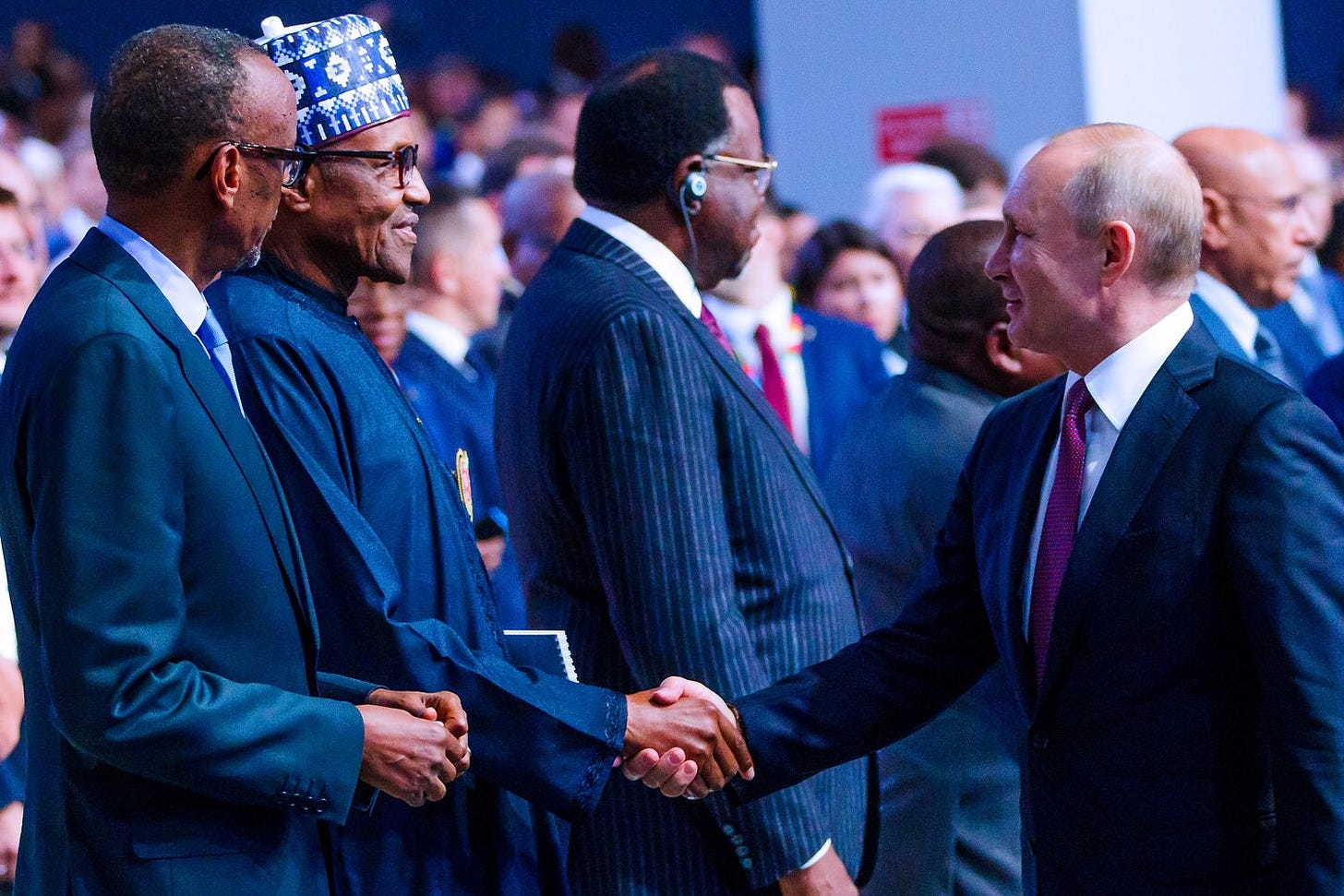It’s Friday!
I missed last week’s newsletter because I had to meet a deadline for a very important paper that had taken months to prepare. But it’s great to be back once again.
This newsletter is about politics, economics, and culture in Nigeria.
I publish once a week, so definitely not spamming your mailbox.
Please subscribe and share with your friends to support my work. And feel free to reach out if you have questions or comments. My email is solomon.elusoji@gmail.com.
On March 2, the United Nations General Assembly overwhelmingly voted against Russia’s invasion of Ukraine and passed a resolution demanding that Moscow stop the fighting and withdraw its military forces. The resolution was supported by 141 of the assembly’s 193 members, including Nigeria.
Supporting the resolution was perhaps the federal government’s most vocal way of signalling its position on the war.
But opposing the war doesn’t mean Nigeria is anti-Russia, as Vladimir Putin would like Russians to believe in the case of the west’s vociferous response to the invasion.
Speaking on national television last month, the Minister of Foreign Affairs, Geoffrey Onyeama, was careful to focus on the military aspect of Russia’s actions in Ukraine, a red line that has justifiably transformed Putin’s Russia into a global pariah.
The historical precedence suggests that Nigeria-Russia relations, at least what is left of it, will be largely unaffected.
At independence, Moscow, existing within the then empire-styled USSR, courted a British-suffused Nigerian government with leftist ideals. But despite its stated commitment to non-alignment, the Tafawa Balewa government was clear about its desire to maintain strong links with its former western masters.
The Nigerian civil war of 1967 presented Moscow with an opportunity to push its agenda and it sided with the federalists. The Soviets supplied air weapons such as MiGs and Ilyushins and later added ground weapons, including heavy (122-mm) guns, a sizable shipment of Kalshnikovs, and 107-mm recoilless rifles. The ground weapons were said to have played a crucial part in tilting the conflict in the favour of the federalists.
But not even the allure of weapons could tempt the Nigerians towards socialism. Yakubu Gowon, the Head of State who prosecuted the civil war, reportedly told the Soviets after the conflict that “Nigerian development could be attained only by remaining in the system of world capitalism.” When it was time to reap profits from Nigeria’s oil fields, Russian companies were sidelined for their western counterparts like Shell-BP, Safrap and Mobil.
Meanwhile, Moscow was also keen on economic links with Nigeria. In 1967, plans to build an iron and steel complex in Nigeria were set in motion when a Soviet team arrived in Nigeria to tour the country, visit iron-ore deposit areas and meet with key officials.
It took almost a decade, in June 1976, for a formal cooperation agreement to be signed. Hopes were high. The project was designed to be Africa’s largest steelworks.
But the Ajaokuta Steel Mill never took off, despite billions of dollars of public money spent.
However, its promise has encouraged Nigerian leaders to play friendly with Moscow. The Shehu Shagari administration, which was deeply pro-West, viewed the project as “an essential precondition for Nigeria’s industrialisation and technological take-off.”
In October 2019, President Muhammadu Buhari travelled to Sochi for a Russia-Africa summit where he met with Putin and asked for completion of the Ajaokuta steel project. Of course, the Russians agreed to help, on paper.
The courting on both sides can be interpreted as purely realist. The Russians, in competition with the west, are happy to extend their influence by providing military and infrastructure support, and the Nigerians, using a non-aligned policy as leverage, will engage only to the extent that its membership of the western capitalist club is not threatened.
One example that illustrates ample Nigerian agency occurred in the 1980s. While condemning the Soviet intervention and continued stay in Afghanistan, the Shagari government refused America’s urgings that Nigeria should not participate in the 1980 Olympic Games in Moscow. Shagari argued that Nigeria was a neutral party “and owes no apology” for its position.
So, Nigeria’s stance on the invasion of Ukraine won’t rattle the Russians. They would not have banked on it anyway.




